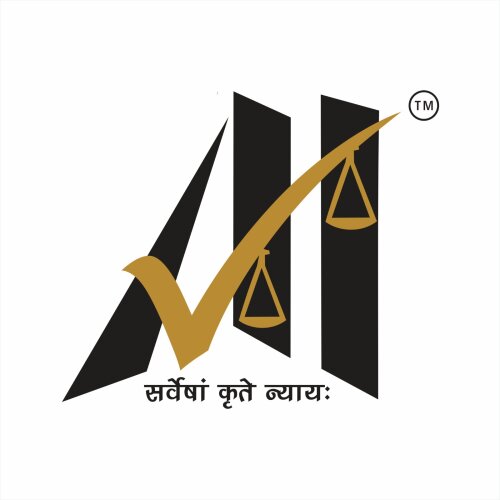Best Tax Lawyers in India
Share your needs with us, get contacted by law firms.
Free. Takes 2 min.
Or refine your search by selecting a city:
List of the best lawyers in India
About Tax Law in India
Tax law in India encompasses the legal rules and regulations governing the taxation system in the country. This includes taxes levied by the central and state governments, and the regulatory bodies responsible for enforcement need compliance from individuals, businesses, and other entities. The primary categories of taxes in India are direct taxes, such as income tax, and indirect taxes, including Goods and Services Tax (GST), customs duties, and more. The Indian taxation system is designed to support economic development and ensure fiscal responsibilities are met, while also aiming for transparency and fairness in tax collection.
Why You May Need a Lawyer
Navigating the complex landscape of tax law in India can be challenging, making legal advice crucial in numerous situations. You might need a lawyer if you are dealing with issues such as tax disputes, scrutiny assessments from the Income Tax Department, or GST compliance troubles. Entrepreneurs might seek legal expertise while setting up a business to ensure proper tax planning and availing tax benefits. Additionally, tax lawyers can assist individuals and businesses during tax audits, filing of appeals, or solving any ambiguity in tax statutes. They provide strategic advice to optimize tax obligations efficiently and legally, hence offering peace of mind and financial security.
Local Laws Overview
India's tax system is governed by distinctive laws and codes representing both federal and state governments. The Income Tax Act, 1961, is the cornerstone for direct taxation, providing guidelines on income computation, tax deductions, and assessments for individuals and corporate entities. The Central Goods and Services Tax (CGST) Act oversees indirect taxation, incorporating state and union territory legislation to ensure comprehensive tax overhauling and reducing the cascading effect of previous tax systems. Other pertinent laws include the Customs Act, 1962, and the Wealth Tax Act, though the latter was abolished in 2015. Keeping up with amendments and making sense of various provisions requires a good grasp of these laws or specialized legal assistance.
Frequently Asked Questions
What is the Goods and Services Tax (GST) in India?
GST is a comprehensive, destination-based tax applied on the manufacture, sale, and consumption of goods and services. It has replaced various indirect taxes and aims to create a unified scheme for taxation across India.
Who is required to file income tax returns in India?
Individuals whose income exceeds the basic exemption limit, companies, and various other entities such as firms, LLPs, and Hindu Undivided Families (HUFs) must file income tax returns.
What are the penalties for late tax return filing in India?
The penalty for late filing can be up to INR 10,000 for individuals whose income exceeds INR 5 lakh. Additionally, there might be interest levied on the outstanding tax amount.
Can I claim a deduction for home loan interest under Indian tax laws?
Yes, individuals can claim a deduction on the interest paid on home loans under Section 24(b) of the Income Tax Act, with a cap of INR 2 lakh per annum for self-occupied properties.
How much is the corporate tax rate in India?
The corporate tax rate varies; for domestic companies with a turnover up to INR 400 crore, it is 25%, while for other companies, it is 30%. However, recent initiatives offer optional lower rates based on certain conditions.
What are tax deductions and exemptions available in India?
Common deductions include those under section 80C for investments like PPF, ELSS, and others under 80D for health insurance premiums. Exemptions include those for house rent allowance (HRA) or leave travel allowance (LTA).
What is Tax Deducted at Source (TDS)?
TDS is a system where tax is collected from the income source itself. It ensures tax collection and helps expand the tax base.
What is the Presumptive Taxation Scheme?
It's a simplified scheme under Sections 44AD, 44ADA, and 44AE of the Income Tax Act, allowing businesses and professionals to declare income at a presumptive rate without maintaining books of accounts.
How can I check my refund status for Income Tax Returns?
Once processed by the Income Tax Department, the refund status can be checked on the official e-filing website or via the NSDL Tax information network by entering relevant details.
Is there a wealth tax in India?
No, the wealth tax was abolished in India in 2015, and there is no wealth tax applicable as of now.
Additional Resources
Several institutions and online platforms provide valuable tax-related information. The Income Tax Department's official website offers comprehensive details on filing returns, deadlines, and notifications. The GST portal is an excellent resource for GST-related queries. Certain government-run platforms offer e-filing help, including guides and FAQs. Professional bodies such as the Institute of Chartered Accountants of India (ICAI) can also offer significant insights and updates on tax laws and amendments. Additionally, many reputed legal or accountancy firms publish blog posts or articles on recent developments in tax law.
Next Steps
If you require legal assistance regarding taxes in India, start by identifying the specific area where you need help. Gather all pertinent financial documents, assessments, notices, and records. Reach out to a qualified tax lawyer or firm with expertise in Indian tax law, ensuring they have a credible track record. Initial consultations often provide clarity on your position and potential costs involved. Consider using government resources and helplines for basic queries before approaching a legal expert. Remember, timely and informed actions in tax matters can prevent or alleviate legal troubles effectively.
Lawzana helps you find the best lawyers and law firms in India through a curated and pre-screened list of qualified legal professionals. Our platform offers rankings and detailed profiles of attorneys and law firms, allowing you to compare based on practice areas, including Tax, experience, and client feedback.
Each profile includes a description of the firm's areas of practice, client reviews, team members and partners, year of establishment, spoken languages, office locations, contact information, social media presence, and any published articles or resources. Most firms on our platform speak English and are experienced in both local and international legal matters.
Get a quote from top-rated law firms in India — quickly, securely, and without unnecessary hassle.
Disclaimer:
The information provided on this page is for general informational purposes only and does not constitute legal advice. While we strive to ensure the accuracy and relevance of the content, legal information may change over time, and interpretations of the law can vary. You should always consult with a qualified legal professional for advice specific to your situation.
We disclaim all liability for actions taken or not taken based on the content of this page. If you believe any information is incorrect or outdated, please contact us, and we will review and update it where appropriate.
Browse tax law firms by city in India
Refine your search by selecting a city.
















